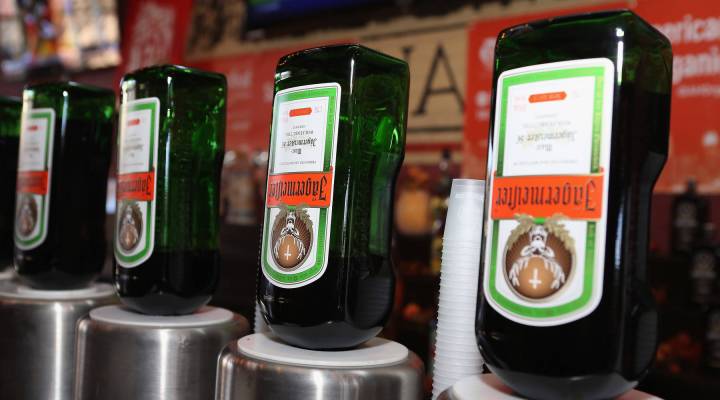
70 businesses selling alcohol in three square blocks: Living in Manhattan’s “Hell Square”
70 businesses selling alcohol in three square blocks: Living in Manhattan’s “Hell Square”

Manhattan’s Lower East Side is a famous neighborhood that contains many smaller, informal neighborhoods within it. There’s the Puerto Rican Loisiaida, the gauntlet of ultra-hip art galleries around Ludlow and Orchard streets, and the Fujianese Chinatown, where you might hear more Mandarin than English.
And then there’s the three-square-block slice of the neighborhood that locals like to call “Hell Square.”
“It’s like basic times drunk, times, like, we’re just gonna get emotional,” said Julia Rose. She’s come down from the quiet Upper East Side for a night of dinner and drinks, and based on her slur, the mission was accomplished.
Hell Square is tiny — three blocks by three blocks. But it sports more than 70 businesses selling alcohol; around 50 have a full liquor license.
“People get very dumb,” Rose explains. “We witnessed a fight that happened over the course of multiple blocks.”
Other common sights, according to long-time resident Jeremiah Moss: hot pink Hummer limousines; bachelorettes with giant penis-shaped balloons; men in blue button-down shirts bathed in Axe Body Spray; Jagermeister shots; copious amounts of vomit.
Moss is the author of “Vanishing New York: How A Great City Lost Its Soul.” He said the hypergentrification of New York City pushed up commercial rents, which turned this former bastion of the counterculture into a playground for “very wealthy young white people and tourists.”
“It’s very much a display of privilege,” Moss said. “They get away with behavior that the people who lived here previously could never imagine.”
Though he barricades himself in his apartment, Moss says he can’t escape the noise. He sleeps with the windows closed, air-conditioner running, white noise machine on and earplugs in.
“The sound has these layers,” Moss said. “The oceanic roar is constant. And then this is punctuated by screaming girls. I don’t know why they’re screaming but they’re screaming. And then you have guys who chant, “whoop, whoop, whoop,” whooping themselves up. It feels like a football thing? I don’t—this is not my culture,” he sighs.
It’s not hard to find locals who share Moss’s disdain. At the office of the neighborhood community board, there’s an entire room devoted to storing liquor license complaints — 17 tall file cabinets’ worth, with extra stacks leaning precariously on chairs and tables.
“We have more licensed establishments than anywhere in the city,” said District Manager Susan Stetzer. “And we absolutely have more 311 complaints.”
Since 2000, the number of liquor licenses in the ZIP code containing Hell Square has more than quadrupled. Stetzer says the state’s “500-foot” law is supposed to prevent this kind of saturation. It states that anyone requesting a liquor license for a location that already has three or more within 500 feet must show that its in the public interest.
“However the State Liquor Authority considers public interest, like … we have fine Italian food,” shrugs Stetzer. The SLA didn’t grant Marketplace an interview.
But the incentives for New York to encourage nightlife are clear. Ariel Palitz, the recently-appointed head of the city’s Office of Nightlife, says the industry supports over 300,000 jobs, and generates revenue in the tens of billions of dollars.
Palitz understands the tensions between neighbors and bar owners — she herself lives above a bar, on the edge of Hell Square. Though she prefers to call it a “social circle” instead.
Whatever the name, the neighborhood was unusually quiet on a recent Saturday. Bouncer King Asubonten says things always slow at the end of the month. “Last week of the month you gotta pay rent,” he said. “But most of the time it’s crazy out here.”
Asubonten lives in the Bronx, and says the neighborhood drama on the Lower East Side lacks some perspective.
“I know there’s a lot of liquor around here,” Asubonten said. “But people spend money, and there’s no gunshots around here. It’s just people enjoying the night.”
There’s a lot happening in the world. Through it all, Marketplace is here for you.
You rely on Marketplace to break down the world’s events and tell you how it affects you in a fact-based, approachable way. We rely on your financial support to keep making that possible.
Your donation today powers the independent journalism that you rely on. For just $5/month, you can help sustain Marketplace so we can keep reporting on the things that matter to you.


















